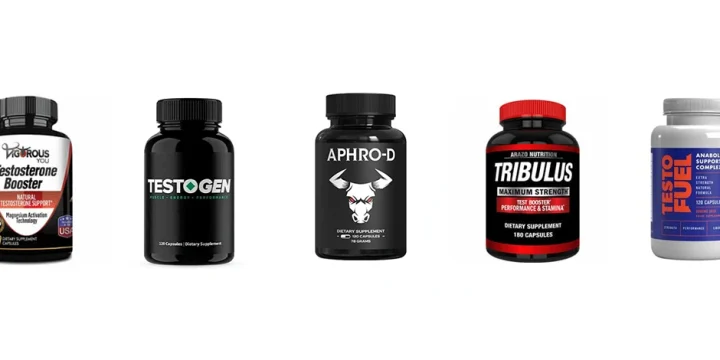In my years as a fitness trainer, I've encountered many clients unknowingly dealing with high testosterone. Understanding how this hormone impacts your body and life is crucial, and I've seen its effects firsthand.
So, to help you understand the signs and effects of high testosterone, I spent hours researching the science behind it. In this article, I will share all the details of what I found out.
Keep on reading.
Quick Summary
- Common signs of high testosterone include mood swings, acne, hair loss, and sleep disturbances in men, and irregular periods, weight gain, and acne in women.
- Identifying high testosterone levels is crucial as they can lead to various physical and psychological changes in both men and women.
- According to a guide found on the WebMD website, normal testosterone levels are less than 836 ng/dL in men and less than 41 ng/dL in women, with higher levels indicating potential health issues.
- From my perspective, understanding and managing testosterone levels is essential for overall health, and natural methods like diet and exercise can be effective in regulating these levels.
What Is High Testosterone?

High testosterone is an unnatural rise in the body's hormone levels, also referred to as hypogonadism.
According to one of the books found on the National Center for Biotechnology Information website, this hormone promotes the development and preservation of reproductive tissues and bone mass in females [1].
Your total levels may be considered excessive if:
- The total level of testosterone is greater than 836 ng/dL in men.
- The free testosterone level is greater than 41 ng/dL in women, according to a guide found on the WebMD website [2].
According to one of the publications found on the ResearchGate website, high T levels in women might also indicate potential reproductive issues such as polycystic ovary syndrome [3].
Because of this, many physicians recommend androgen replacement therapy to reduce the levels of this hormone.
Symptoms of High Testosterone

From my experience, excessive testosterone can significantly alter physical appearance. I've observed the following symptoms in both male and female clients.
What Are the Signs of High Testosterone in Men?
In my personal training career, I've seen men exhibit signs like mood changes, acne, and difficulty sleeping due to high testosterone.
While higher-than-normal testosterone in males is rare, if your levels do jump and remain elevated for an extended period, you may encounter these symptoms:
- Acne: Testosterone can cause an increase in sebum secretion (an oily material present on the skin), resulting in blocked pores and acne. As a result, men with higher total testosterone may have more acne than guys with low testosterone levels [4].
- Hair loss: Some individuals with elevated testosterone suffer from androgenetic alopecia, often known as male-pattern baldness. High T may induce body hair loss in persons genetically predisposed to male-pattern baldness [5].
- Mood swings: Increased testosterone levels might lead to mood problems such as anger and aggressive behavior. It could also increase your likelihood of taking risks, particularly if anabolic steroid misuse is the source of your high T levels [6].
- Sleep issues: Excess total testosterone levels can induce agitation and trouble sleeping or staying asleep.
What testosterone does to men is that high T levels may influence your circadian clock.
Some physicians even employ testosterone therapy to treat sleep apnea, although the outcomes are inconclusive [7].
Signs of High Testosterone in Women
Normal testosterone levels in women typically decline with age.
But, occasionally, the balance flips in the reverse direction, and testosterone rises rather than falls.
Excess testosterone levels can have negative consequences and produce distressing signs in women, such as:
- Having period abnormalities or lack of periods
- Experiencing weight gain
- Having blocked pores in the skin (acne)
- Experiencing clitoris enlargement
- Balding, particularly around the hairline
- Noticing an increased muscle mass
- Experiencing reduced breast size
- Having high blood pressure
- Voice deepening or hoarseness
- Having hair growth on the chin or top lip (hirsutism)
Aside from these symptoms, according to research, elevated levels of estrogen and testosterone in women have been linked to an increased chance of having uterine fibroids, which are benign uterus tumors [8].
What Are the Causes of High Testosterone?

The causes of high testosterone may be testicular cancer, an overdose of testosterone boosters, and anabolic steroid misuse in men, as well as polycystic ovarian syndrome, congenital adrenal hyperplasia, and hirsutism in women.
Causes of High Testosterone in Men
Men may have excess testosterone due to the following:
- Tumors: Testicular and adrenal cancers can generate abnormally high testosterone levels [9].
- Anabolic steroids misuse: Taking anabolic steroids to gain muscle mass, curb weight gain, or improve athletic performance can lead to high levels of testosterone. Some athletes use Clomid unlawfully to improve their performance which may, in turn, lead to high T levels [10].
- Testosterone supplements: Excessive usage of testosterone boosters or testosterone replacement therapy can lead to high T levels. Your physician, in this case, will monitor your T levels to make sure they stay within a healthy range [11].
- Testosterone gel: Excessively applying or getting into contact with testosterone gel from another individual could be harmful. The gel may be accidentally rubbed onto another person, increasing their testosterone production unintentionally [12].
Causes of High Testosterone in Women
The causes of high testosterone in women are due to congenital adrenal hyperplasia, polycystic ovary syndrome, and hirsutism.
- CAH (congenital adrenal hyperplasia): Refers to hereditary illnesses affecting the adrenal glands. These glands produce the hormones aldosterone and cortisol, thus regulating metabolism and blood pressure, as well as DHEA and testosterone. People suffering from this condition lack a group of enzymes required to control the synthesis of these hormones, resulting in insufficient cortisol and excessive testosterone [13].
- Polycystic ovarian syndrome (PCOS): A disorder that occurs when the ovaries or adrenals generate an abnormally high level of male sex hormones. PCOS affects 10% of women and may disrupt a woman's menstruation cycle, causing reproductive problems [14].
"Measuring testosterone levels is a popular blood test used to help with the diagnosis of PCOS and may be helpful when researching the causes of infertility."
- Dr. Joely Straseski, Doctor of Philosophy
- Hirsutism: A hormonal disorder that causes undesired body hair to develop on women's chest, back, and face. The level of body hair development is strongly genetically determined; however, this disorder is caused mainly by androgen hormonal imbalances [15].
Natural Treatments for High Testosterone

Based on my experience, natural methods like diet modifications and regular exercise can effectively manage testosterone levels. I always advise my clients to try these approaches before considering medical intervention.
Diet Change
Spearmint herbal tea, flaxseed, and licorice root may lower testosterone.
However, the only thing that experts agree on is that a low-carbohydrate diet may assist you in naturally lowering your insulin levels.
It's a good technique to maintain testosterone levels low since increasing insulin causes your body to create more testosterone.
I usually advise my clients to eat a balanced, nutritious diet to reduce their testosterone levels.
A 2015 study found that a low carbohydrate and a low dairy diet helped lower testosterone levels in women with PCOS after eight weeks.
It also helped with insulin sensitivities, as insulin resistance is a side effect of PCOS [16].
Exercise

Daily exercise may help you naturally lower insulin and androgen concentrations, balancing your hormones.
Strive for 30 minutes of gentle activity each day, and consult your physician for a customized exercise regimen.
Personally, I keep active all the time by walking, running, cycling, and weight lifting.
By doing so, my body utilizes the insulin in the blood better, thus reducing insulin resistance and balancing my hormones.
FAQs
Is Having High Testosterone Good?
It is not good to have high testosterone levels. An increase in this male sex hormone can lead to effects such as mood swings and balding.
Does Masturbating Reduce Testosterone?
No, masturbation has not been shown to affect testosterone levels substantially in the long run.
Do Tall Guys Have More Testosterone?
No, tall guys do not have more testosterone. There is no link between male stature and increased levels of testosterone.
How Does High Testosterone Affect Cognitive Function?
Elevated testosterone levels can influence cognitive abilities, potentially enhancing certain cognitive functions like spatial abilities, but may also lead to increased risk-taking behaviors. It's important to understand that the relationship between testosterone and cognitive function is complex and varies among individuals.
Can High Testosterone Levels Affect Sleep Patterns?
High testosterone levels can disrupt normal sleep patterns, potentially leading to sleep disturbances or insomnia. Maintaining balanced testosterone levels is crucial for healthy sleep and overall well-being.
What Are the Long-Term Health Impacts of Sustained High Testosterone Levels?
Sustained high testosterone levels can increase the risk of certain chronic conditions, such as cardiovascular diseases and hormonal imbalances. Long-term management of testosterone levels is essential for preventing potential health complications.
How Do Genetic Factors Influence Testosterone Levels?
Genetics plays a significant role in determining an individual's natural testosterone levels, with some people genetically predisposed to having higher or lower levels. Understanding these genetic factors can help in personalizing health and wellness strategies.
What Is the Impact of Diet on Testosterone Levels?
Certain diets, particularly those high in specific nutrients like zinc and healthy fats, can contribute to elevated testosterone levels. It's important to consider dietary habits when managing testosterone levels for hormonal balance.
References:
- https://www.ncbi.nlm.nih.gov/books/NBK526128/
- https://www.webmd.com/a-to-z-guides/testosterone-test
- https://www.researchgate.net/publication/273322572
- https://www.ncbi.nlm.nih.gov/books/NBK459173/
- https://www.ncbi.nlm.nih.gov/pmc/articles/PMC5817427/
- https://www.sciencedirect.com/science/article/pii/S0033318213001333?via%3Dihub
- https://pubmed.ncbi.nlm.nih.gov/24739309/
- https://www.webmd.com/women/uterine-fibroids/uterine-fibroids
- https://www.ncbi.nlm.nih.gov/pmc/articles/PMC4490795/
- https://pubmed.ncbi.nlm.nih.gov/16422830/
- https://www.ncbi.nlm.nih.gov/pmc/articles/PMC3897047/
- https://www.ncbi.nlm.nih.gov/books/NBK534853/
- https://www.mayoclinic.org/diseases-conditions/congenital-adrenal-hyperplasia/symptoms-causes/syc-20355205
- https://www.ncbi.nlm.nih.gov/pmc/articles/PMC3737989/
- https://www.ncbi.nlm.nih.gov/pmc/articles/PMC2856356/
- https://www.ncbi.nlm.nih.gov/pmc/articles/PMC4516387/
About The Author
You May Also Like






